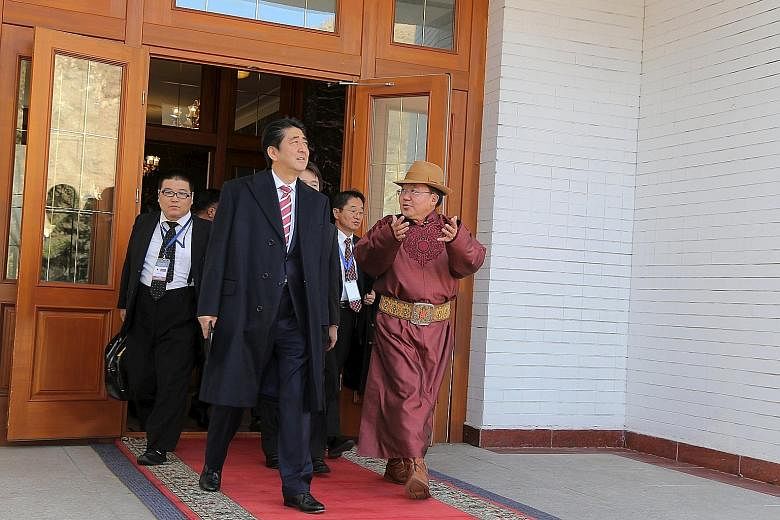TOKYO • Japanese Prime Minister Shinzo Abe has kicked off a week-long tour to Mongolia and five Central Asian nations, eyeing billions of dollars in business deals as China boosts its influence in the resource-rich region.
The conservative leader, who has been pushing to kick-start the world's No. 3 economy, was accompanied by representatives of about 50 Japanese firms.
He arrived in Ulan Bator yesterday, his first visit to Mongolia since 2013. He will later travel to Kazakhstan and Uzbekistan, and make the first official visit by a Japanese premier to Turkmenistan, Tajikistan and Kyrgyzstan.
"Mongolia and Central Asia are at the centre of Asia and very important geopolitically," Mr Abe told reporters at a Tokyo airport ahead of his departure.
These countries "have relied on exports of natural resources, but now are seeking high-quality infrastructure as they aim for an economy based on high value-added" industries, he said.
"I would like to take a huge step in boosting ties with each country," said Mr Abe. The Prime Minister has gone on a whirlwind global tour since sweeping to power in late 2012, visiting dozens of countries in a bid to boost Japan's economy.
During the tour, Japanese engineering firm JGC and four other companies are expected to sign a one trillion yen (S$11.6 billion) deal in Turkmenistan for the construction of a plant linked to natural gas fields, the leading Nikkei business daily said.
As rival China seeks to tap the region through its new Asian Infrastructure Investment Bank (AIIB), Mr Abe has pledged to triple infrastructure orders from Japanese firms globally, including in Central Asia, to 30 trillion yen by 2020.
The AIIB is seen as a rival to the Washington-based World Bank and the Manila-based Asian Development Bank, which has been headed by biggest donor Japan since it was founded in 1966. The United States and Japan have notably declined to join the China-led AIIB.
Observers say China's influence in Central Asia has been growing as Russia's has declined, with Beijing becoming the region's leading trading partner.
Chinese President Xi Jinping unveiled the Silk Road Economic Belt - a vision of massive investments in infrastructure to power overland trade and economic integration across Eurasia - during his speech given in energy-rich Kazakhstan in 2013.
Separately, Japan has offered to finance India's first bullet train, estimated to cost US$15 billion (S$20.9 billion), at an interest rate of less than 1 per cent, officials said, stealing a march on China, which is bidding for other projects on the world's fourth-largest network.
Tokyo was picked to assess the feasibility of building the 505km corridor linking Mumbai with Ahmedabad, the commercial capital of Prime Minister Narendra Modi's home state, and concluded it would be technically and financially viable. The project to build and supply the route will be put out to tender, but offering finance makes Japan the clear front runner.
Tokyo's push in India comes just weeks after it lost out to China on the contract to build Indonesia's first fast-train link.
AGENCE FRANCE-PRESSE, REUTERS

